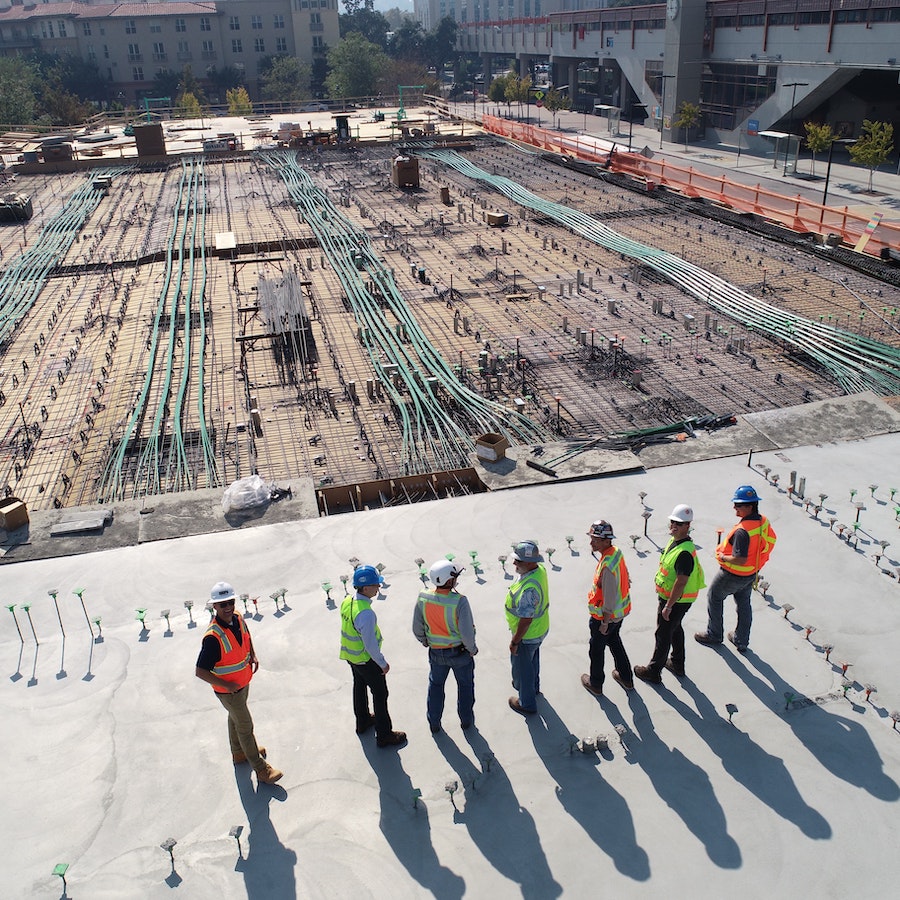In today’s workplace, construction internet is a serious subject.
According to Jeremy Renner, the successful real-estate developer (who also happens to be a Hollywood actor on the side):
“Building is about getting around the obstacles that are presented to you.”
Construction sites and civil engineering projects by their very nature carry a unique set of challenges which, if you don’t address during the planning phases, can be detrimental to the productivity of your workforce.
Plan, Plan, Plan
It’s not just the physical deliverables of the project itself that need to be well planned. Keeping up with compliance requirements, maintaining cashflow, site security, health & safety, and providing the right site office environments are just some of the many obstacles to face in this complex industry.
A construction site’s internet connectivity service should not be excluded from the planning stage. The objective here is to create a robust administrative function on site. Where daily communication, information sharing and management tasks can be accomplished without the risk of delaying the project completion date.
We all know that inadequate connectivity can result in a lack of progress, and huge frustrations.
Conference calls cutting out, printers unable to receive data / print, documentation stuck getting from A to B…..
This type of workplace environment doesn’t foster efficiency, and can feel stressful and unprofessional. It certainly doesn’t set the right foundations for a successful construction or civil engineering project.
And yet, we introduce more challenges to the mix. The invention of metal site cabins restrict the electromagnetic waves of 4G and 5G. Construction site locations often come with limited 4G and 5G.
Whether it’s too remote a location, or too busy a location (with contention issues slowing down progress), construction internet certainly isn’t straight forward.
It’s not all doom and gloom
But, when all that’s said and done, it’s not a gloomy outlook for the construction site worker. The right construction internet solution will allow effortless access to SaaS tools like Autodesk, Teams, Fieldwire and Monday that help teams to collaborate, offering seamless online meetings, fast transfer of documentation, and helping to improve efficiency between colleagues.
But how do you know which internet solution/s to consider and which one is right for you? Here we discuss the 4 main construction internet options used on site today, and cover their pros and cons.
Achieving fast and reliable construction site internet
For any construction site manager considering their internet connectivity options, the reality is that the best solution for you may involve a combination of 2 or more of the solutions covered here.
Understanding the nature of your requirement, the lead time, and the how the project will develop throughout its course will help you to arrive at the best choice:
1. Fixed Fibre
Fixed fibre is a long-term leased line that typically comes with a 4-5 month installation lead time. This means that first and foremost, this option requires planning for WELL in advance of any construction project.
If you fail to give adequate notice, your fixed fibre supplier can offer a temporary WiFi solution to service the weeks or months running up to the installation date.
(Which begs the question that if a construction WiFi solution can be good enough for a few weeks/months, can this be used as a long term solution?)
Fixed fibre offers the most reliable internet service for a construction site, without service dropouts, or contention issues. Once it’s in, short of cutting through the fibre, it provides a dedicated, reliable and high grade internet access to your site.
However it is also the most costly, which can be prohibitive to some projects as an option.
With up-front installation costing in the £thousands, and monthly ongoing costs in their £hundreds, combined with a typical minimum contract term of 12-24 months, fixed fibre is really only a viable solution for long-term construction projects (we’re generally talking years here).
Ultimately there is a tipping point where the reliability benefits of a fixed fibre installations don’t stack up over a Satellite or 4G/5G option.
2. Satellite
Easy to deploy, Satellite solutions can be installed within a few days and are a great option where 4G / 5G isn’t readily available. Think remote locations, where there’s a lot of ‘sky’ and not much else – this is where Satellite technology really comes into its own.
Early Satellite technology could be rather cumbersome to move around, and this technology requires a high level of experience to correctly find, and lock onto, the Satellite signal. A small knock to the hardware can take down the whole network, so a skilled engineer installation and ongoing protection whilst on site is required.
But Satellite solutions are rapidly being modernised, so offer more accessibility, reliability and stability from Satellite as a solution.
Satellite solutions however, can incur occasional internet drop-outs, and this is beyond a service providers’ control. It’s something that a construction site will need to cope with if using Satellite on its own without a backup internet solution.
And they can be high latency, meaning they are not always good for voice calls.
In terms of cost, Satellite technology is an expensive option when compared to 4G/5G, albeit comparatively less than fixed fibre, so it offers a good middle ground where 4G/5G isn’t available.
We recommend that Satellite is considered alongside a backup 4G/5G solution where seamless connectivity is of critical importance, to help mitigate any impact of service drop-out.
3. 4G / 5G
4G and 5G can often be termed as LTE, which offers the easiest and fastest deployment of internet connectivity compared to Satellite and fixed fibre. With routers and hardware being so readily available, and relatively easy to source, 4G/5G is the construction site’s best friend when it comes to internet connectivity. That’s providing there is some level of service available at the site location.
With many 4G/5G service providers on the market (Vodafone, O2, EE etc), there is never a shortage of options, and backup service providers are plentiful should one network go down. It just becomes a case of finding the best service provider for the location, and having a backup option readily available for failover should it be required. A WiFi provider’s skillset is in understanding this, and building you the best solution for the job.
Hardware is an important consideration for 4G/5G solutions and the equipment used in an installation (take for example, the LTE Cat), can determine the performance of the internet connection.
4G / 5G, performance will be impacted by contention. This means that when more people in the area are using the same network, connectivity can drop. So if your construction site is next to Glastonbury, or in central London, then you could be heading for trouble at certain times of the day / year.
The fact of 4G / 5G remains that you need an experienced provider to accurately predict contention issues and service levels, and come up with a solution to cope with the location and connectivity requirements of your construction site.
Get it right with 4G / 5G and this is the easiest, most cost-effective solution. It offers the added benefit of being portable, allowing you to move the solution around the site as the construction project progresses.
Mobile Hotspots
Still used today by construction site workers, the mobile hotspot will often be a temporary workaround just to get the job done. A mobile hotspot is the most portable solution, following the individual wherever they are on site. We hesitate to offer this as a construction internet option, as it should not be considered as a business grade solution. We have just put it here because the reality is that construction site workers still use it as a method of connectivity out of habit.
Of course, mobile hotspots weren’t built to cope with the demands of an office environment, and don’t offer the reliability required for business grade internet connectivity.
With proper planning, a construction company shouldn’t ever need to use mobile hotspots for internet connectivity.
Summary
The right construction internet solution depends on the requirements for each construction project. You should take into account considerations such as length of time, available 4G/5G, number of staff, cabin material, mobility etc. Consult with your service provider on the right solution for you, the right one will save you time and money.
Regardless of the method chosen, you should not confuse internet connectivity with a construction site WiFi solution. This is the means of distributing internet connectivity across the site, to ensure that individual cabins and visitors can access the internet securely. But we’ll leave that topic for another time.
To discuss internet access for your site, or to get a quote, contact Fli-Fi.















